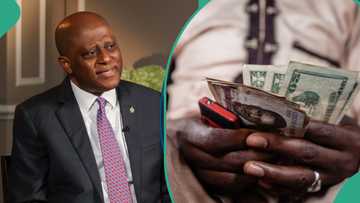New FX Rule: CBN Orders BDCs to Mark Dollar Transactions on International Passports
- CBN requires that all transactions involving end users' BVNs and dollar sales on foreign passports be documented
- This aims to enhance tracking, transparency, and anti-money laundering efforts in the foreign exchange market operated by BDCs
- These restrictions also include a weekly purchase ceiling of $25,000 per BDC from authorized dealers
Legit.ng journalist Zainab Iwayemi has 5-year-experience covering the Economy, Technology, and Capital Market.
New guidelines released by the Central Bank of Nigeria (CBN) for Bureau de Change (BDC) operators require that all transactions involving end users' Bank Verification Numbers (BVNs) and dollar sales on foreign passports be documented.

Source: Getty Images
In the foreign currency market run by BDCs, the new rule seeks to improve tracking, transparency, and anti-money laundering initiatives.
The CBN announced these limits, which include a weekly purchase cap of $25,000 per BDC from authorized dealers, in a circular signed by W. J. Kanya, acting director of the Trade and Exchange Department.
The circular stated:
“Authorised dealers shall sell foreign exchange cash to BDCs subject to a maximum of $25,000.00 to a BDC per week. A BDC shall approach its preferred authorised Dealer Bank (ADB) and can only procure the said amount from only that bank of its choice in a week. Any breach of this condition will attract appropriate sanction.”
The CBN also made it clear that BDCs must sell the foreign exchange they buy to end users at a margin of no more than 1% over the acquisition price. All monies, regardless of their source, will be subject to this margin.
“Foreign exchange cash purchased by BDCs from Authorised Dealer Banks shall be sold to foreign exchange end-users at a rate not exceeding 1 percent margin above the buying rate,” the CBN said.
Additionally, BDCs must use the Financial Institutions Forex Reporting System (FIFX) to submit daily returns on their sales and purchases of foreign currency from authorized dealers and other sources.

Read also
Access, Zenith, others sell dollar at new rate as naira trades flat amid CBN FX sales to BDCs
BDC-purchased funds are limited to certain qualified transactions, such as overseas education expenses, overseas medical fees, business travel allowance (BTA), and personal travel allowance (PTA). $5,000 is the quarterly maximum disbursement per transaction.
The end-user's BVN and the beneficiary's international passport endorsement of the amount disbursed must also be included in all transaction records.
“It is to be noted that Authorised Dealer Banks and BDC operators shall ensure strict compliance with the provisions of Anti-Money Laundering Laws and observance of appropriate KYC principles in the handling of these transactions,” the CBN stated.
The circular also cautioned that any authorized dealer or BDC that disobeys these rules or embezzles money will be subject to the proper penalties, which may include having their dealership license suspended.
“Any Authorised Dealer and BDC that diverts funds or violates the provision of these guidelines shall attract appropriate sanction,” the CBN noted.
BDC operators plan mergers
Legit.ng reported that Bureau De Change (BDC) operators in Nigeria have started discussions on mergers and acquisitions to meet the recapitalisation deadline set by the Central Bank of Nigeria (CBN).
In a circular issued in May 2024, the CBN released fresh guidelines for the operations of the Bureau De Change in Nigeria, which include two new categories of licenses with different capital bases.
According to the new rules, BDCs in the Tier 1 category would be required to have a minimum capital requirement of N2bn, pay N1m as a non-refundable application fee, and N5m as a non-refundable licence fee.
Proofread by Kola Muhammed, journalist and copyeditor at Legit.ng
PAY ATTENTION: Сheck out news that is picked exactly for YOU ➡️ find the “Recommended for you” block on the home page and enjoy!
Source: Legit.ng




